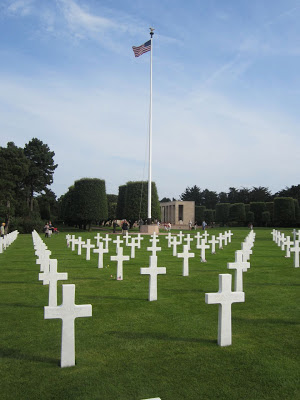 |
| Omaha Beach, 2012 |
Perched high atop a cliff overlooking the rugged coastline of France, the Normandy American Cemetery and Memorial is a place that defies all superlatives. Everything about it is staggering: the size, the number of graves, the way the sheer beauty of the place contrasts with the desperate battle that waged just below, on Omaha Beach. Looking out over the English Channel on a peaceful day, it's hard to imagine the bloodshed of June 6, 1944.
Visitors enter through a museum that tries to bring some of that enormity down to size. A video tells the stories of a few individual soldiers. World War II uniforms, ration packs, medical kits, letters, equipment, maps, photographs, and more depict the build-up to D-Day and the execution of Operation Overlord. The museum alone could absorb half a day of contemplation. And somehow, it still doesn’t prepare you for what’s next.
For beyond the museum doors lies a sea of green grass and white marble headstones, seemingly without end. Stretched out in neat rows are 9,387 Latin crosses and Stars of David, each marking the final resting place of an American serviceman. Many are unknown. A reverent hush lies over the place as visitors wander through, some looking for a special grave, some just trying to take it all in. There is no doubt that this is sacred ground.

 The markers are engraved only with the person’s name, company or division, state, and date of death. Perhaps, as someone suggested to us, it was believed that including the date of birth would make the cemetery seem overwhelmingly sad. We were reminded that 60 percent of the Americans who perished in Europe were sent back to the states for burial, so the ones buried here represent only a fraction of the total losses.
The markers are engraved only with the person’s name, company or division, state, and date of death. Perhaps, as someone suggested to us, it was believed that including the date of birth would make the cemetery seem overwhelmingly sad. We were reminded that 60 percent of the Americans who perished in Europe were sent back to the states for burial, so the ones buried here represent only a fraction of the total losses.The Memorial, which sits in front of a large reflecting pool, features a striking statue depicting “The Spirit of American Youth Rising from the Waves.” Engraved tablets record the names of 1,557 missing in action, while stone maps show the positions of the D-Day landings and air operations. Fresh flowers at the base of the statue express gratitude to the sacrifices of the World War II generation. The families of Dachau concentration camp victims and survivors send a new arrangement every week.
Two American flags fly proudly over the cemetery. At the end of each day, the flags are lowered, one at a time, while a single trumpet plays Taps.
It’s a sight and sound I hope I never forget. Thank you, all who served, and especially those who rest today in Normandy.
--Shelley
© Shelley Bishop 2013.








Thanks for sharing these photos, memories, and impressions again, Shelley. We in America have so much to be grateful for - and so many to whom we owe gratitude for the freedoms we have.
ReplyDeleteYes we do, Nancy.
ReplyDelete